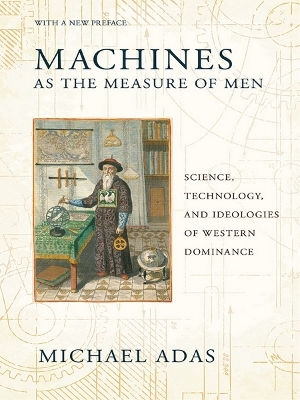
Machines as the Measure of Men
Cornell University Press (Verlag)
978-0-8014-7980-9 (ISBN)
Over the past five centuries, advances in Western understanding of and control over the material world have strongly influenced European responses to non-Western peoples and cultures. In Machines as the Measure of Men, Michael Adas explores the ways in which European perceptions of their scientific and technological superiority shaped their interactions with people overseas. Adopting a broad, comparative perspective, he analyzes European responses to the cultures of sub-Saharan Africa, India, and China, cultures that they judged to represent lower levels of material mastery and social organization.
Beginning with the early decades of overseas expansion in the sixteenth century, Adas traces the impact of scientific and technological advances on European attitudes toward Asians and Africans and on their policies for dealing with colonized societies. He concentrates on British and French thinking in the nineteenth century, when, he maintains, scientific and technological measures of human worth played a critical role in shaping arguments for the notion of racial supremacy and the "civilizing mission" ideology which were used to justify Europe's domination of the globe. Finally, he examines the reasons why many Europeans grew dissatisfied with and even rejected this gauge of human worth after World War I, and explains why it has remained important to Americans.
Showing how the scientific and industrial revolutions contributed to the development of European imperialist ideologies, Machines as the Measure of Men highlights the cultural factors that have nurtured disdain for non-Western accomplishments and value systems. It also indicates how these attitudes, in shaping policies that restricted the diffusion of scientific knowledge, have perpetuated themselves, and contributed significantly to chronic underdevelopment throughout the developing world. Adas's far-reaching and provocative book will be compelling reading for all who are concerned about the history of Western imperialism and its legacies.
First published to wide acclaim in 1989, Machines as the Measure of Men is now available in a new edition that features a preface by the author that discusses how subsequent developments in gender and race studies, as well as global technology and politics, enter into conversation with his original arguments.
Michael Adas is Abraham E. Voorhees Professor of History and Board of Governors' Chair at Rutgers, The State University of New Jersey.
Preface to the 2014 Edition
Introduction
Part I. Before the Industrial Revolution
Chapter 1. First Encounters: Impressions of Material Culture in an Age of Exploration
Technology—Perceptions of Backwardness: Qualified Praise
"Natural Philosophy"—Illiteracy and Faulty Calendars
Scientific and Technological Convergence and the First Hierarchies of Humankind
Chapter 2. The Ascendancy of Science: Shifting Views of Non-Western Peoples in the Era of the Enlightenment
Model of Clay: The Rise and Decline of Sinophilism in Enlightenment Thought
Ancient Glories, Modern Ruins: The Orientalist Discover of Indian Learning
African Achievement and the Debate over the Abolition of the Slave Trade
Scientific Gauges and the Spirit of the Times
Part II. The Age of Industrialization
Chapter 3. Global Hegemony and the Rise of Technology as the Main Measure of Human Achievement
Africa: Primitive Tools and the Savage Mind
India: The Retreat of Orienta1ism
China: Despotism and Decline
Materia1 Mastery as a Prerequisite of Civilized Life
Chapter 4. Attributes of the Dominant: Scientific and Technological Foundations of the Civilizing Mission
Perceptions of Man and Nature as Gauges of Western Uniqueness and Superiority
The Machine as Civilizer
Displacement and Revolution: Marx on the Impact of Machines in Asia
Time, Work, and Discipline
Space, Accuracy, and Uniformity
Worlds Apart: The Case of Ye Ming-chen
Chapter 5. The Limits of Diffusion: Science and Technology in the Debate over the African and Asian Capacity for Acculturation
The First Generations of Improvers
The Search for Scientific and Technological Proofs of Racial Inequality
Qualifying the Civilizing Mission: Racists versus Improvers at the Tum of the Century
Missing the Main Point: Science and Technology in Nineteenth-Century Racist Thought
Part III. The Twentieth Century
Chapter 6. The Great War and the Assault on Scientific and Technological Measures of Human Worth
The Specter of Asia Industrialized
Trench Warfare and the Crisis of Western Civilization
Challenges to the Civilizing Mission and the Search for Alternative Measures of Human Worth
Epilogue: Modernization Theory and the Revival of the Technological Standard
Index
| Reihe/Serie | Cornell Studies in Comparative History |
|---|---|
| Verlagsort | Ithaca |
| Sprache | englisch |
| Maße | 155 x 235 mm |
| Gewicht | 907 g |
| Themenwelt | Geschichte ► Allgemeine Geschichte ► Neuzeit (bis 1918) |
| Geschichte ► Teilgebiete der Geschichte ► Technikgeschichte | |
| Geschichte ► Teilgebiete der Geschichte ► Wirtschaftsgeschichte | |
| Naturwissenschaften | |
| ISBN-10 | 0-8014-7980-0 / 0801479800 |
| ISBN-13 | 978-0-8014-7980-9 / 9780801479809 |
| Zustand | Neuware |
| Haben Sie eine Frage zum Produkt? |
aus dem Bereich


